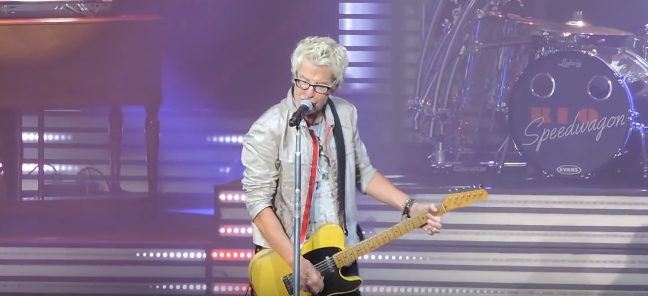REO Speedwagon's Kevin Cronin on Gear, His Piano Skills and the Songs that Should Have Been Hits

With over 40 million albums sold, REO Speedwagon are best known for classic rock anthems like “Keep On Loving You,” “Can’t Fight This Feeling” and “Don’t Let Him Go.” As a result of multi-platinum albums like 1980’s Hi Infidelity, 1982’s Good Trouble and 1984’s Wheels Are Turnin’, REO Speedwagon are often thought of exclusively as an Eighties band. The reality though, is quite different.
Not only is the group still co-headlining arenas all these years later—its Summer 2018 North American run with Chicago kicks off on June 13th—the roots of REO Speedwagon go all the way back to 1967.
Kevin Cronin first played with REO Speedwagon in 1972, and became a permanent member of the group in 1976. Beyond singing those aforementioned radio staples, Cronin also wrote or co-wrote (and co-produced) those songs. However, Cronin is not the only mainstay of the Illinois-based quintet. Keyboardist Neal Doughty has been there since 1967 and bassist Bruce Hall joined in 1977. Lead guitarist Dave Amato—who toured and recorded with Ted Nugent, in addition to doing sessions for David Lee Roth, Rick Springfield and Mötley Crüe, before joining REO—and drummer Bryan Hitt—whose pre-REO credits include Graham Nash and The Spencer Davis Group—are “the new guys,” having coming aboard in 1989.
We sat down with Cronin to discuss the band's history, gear and the REO songs that should have been hits in this new interview.
Was there a particular artist or album that inspired you to start playing guitar?
I started playing guitar because my parents wouldn’t let me have a drum set. I was in sixth grade, and my dad said the guitar was the perfect instrument because I could take it with me to parties. I guess he was right.
You are primarily thought of as a guitar player, but a few of your hits are piano-based songs. Which instrument did you start playing first?
Get The Pick Newsletter
All the latest guitar news, interviews, lessons, reviews, deals and more, direct to your inbox!
I took lessons at Rossi Music in Chicago, and used to get chased through the neighborhood and beat up just because I was carrying a guitar case. Then The Beatles played on The Ed Sullivan Show, and the same dudes who were trying to kick my ass were now begging me to let them be in my band. It turned out that girls liked guitar players better than tough guys.
We had an old, out of tune, upright piano in our basement when I was a kid, so I would hang out and figure out chords down there. Then when I joined REO, our original guitar player—the late, great Gary Richrath—and I would sneak into the music building at the University of Illinois in Champaign and play piano there. I wish I would have taken lessons, but as it is I can pretty much only play the songs I write on piano. Actually, Neal played “Can’t Fight This Feeling” on the record because the piano part was way above my pay grade.
When hitting the road for a full-fledged arena or shed tour, around how many guitars do you take?
You would need to ask my good friend, and guitar tech, Steve “Smooth” Summers about this one. I know I never leave home without my trusty ‘52 Telecaster. People tell me it's too valuable to take on tour, but I love playing that guitar so much that I don’t care. The neck fits my left hand perfectly, and it sounds exactly how I think an electric guitar should sound. If someone swipes it, that would be total bad karma for them. Anyway, Smooth would chase them down, and kick their ass. He guards that guitar with his life.
Has your touring rig changed in recent years? Did you ever consider changing over to Pod amplfiiers?
I love the sound of my Vox AC 30s. REO lead guitar player Dave Amato sets me up with new amps when he thinks I need them. Dave recently gave me a mid Sixties Fender Bandmaster, just like the one I had in high school. That was the coolest gift ever. Dave is a great guy. I leave that amp at home, and my sons’ band plays through it.
You have a signature guitar through Ovation. Was that your first signature model?
I have been playing Ovations on tour since they first introduced the slim body, Viper-style in around 1982. It's the perfect acoustic guitar to play with a rock band. It looks cool, feels right, and the sound cuts through the mix. My signature model is a replica of the black, pearl inlaid model which I play on tour. It was also important to me that Ovation design a beginner’s model as well, so that kids starting out could beg their parents for one, just like I used to annoy my folks when I was starting out.
REO Speedwagon is often called a classic rock band, or at least the band's music is regularly in rotation on classic rock radio. When did you first start to notice that you had a catalog that was going to be evergreen? Or at least that people thought of Speedwagon as being a classic band?
I am proud to be called a “classic rock band.” I consider our longevity to be a badge of honor. At the same time, I am humbled by the continuing support of the awesome people who continue to come out and see us play. My plan is that when all is said and done, REO will be the last band standing.
Are there any Speedwagon songs that you feel didn't get their due and should have been as big as a "Keep On Loving You" or "Can't Fight This Feeling?"
I am very proud of the song “Building The Bridge.” That song poured out of me, and truly expresses my worldview. I wish we would have made a better recording, but it’s still pretty good. “In My Dreams” is another one where we totally overproduced the song. I wrote it as a simple, acoustic guitar number, and we overdubbed the life out of it. Sometimes you give it your best shot, try being innovative, and you end up wishing you would have just sat down with a nice, old Martin acoustic and played the song as it was meant to be. Oh well, we survived.
Finally, is there something you wish more people knew about REO Speedwagon?
There are more things that I’m glad people don’t know about REO. We did some crazy shit back in the Eighties. Thanks God there were no smartphone cameras around during the Good Trouble tour!
“This particular way of concluding Bohemian Rhapsody will be hard to beat!” Brian May with Benson Boone, Green Day with the Go-Gos, and Lady Gaga rocking a Suhr – Coachella’s first weekend delivered the guitar goods
“I was writing songs from eight years old, but once I got a guitar I began to deeply identify with music… building an arsenal of influences”: How Lea Thomas uses guitars her dad built to conjure a magic synthesis of folk, pop and the ethereal









